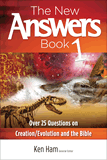Terrorist attack leaves writer asking questions
This letter to the editor was first printed in The Daily Courier (Forest City, North Carolina, USA), September 22, 2001. We think it speaks for itself…
To the editor:
I’m in my 30’s but I’ve lived long enough to see a lot of pain and senseless tragedy in life. A prime example has been the recent terrorist attacks in New York and Washington, D.C.
As I try to come to grips with the catastrophe, I am beginning to question the worldview I acquired while attending public school. I am not finding reasonable answers to four questions that have come to the forefront of my mind since terrorists brutally attacked our country.
Our nation is outraged at the senseless deaths of thousands of Americans, but what is it that makes us lament the loss?
My first question pertains to human dignity and worth. Why do human beings have worth, and where did they get it? Our nation is outraged at the senseless deaths of thousands of Americans, but what is it that makes us lament the loss? My textbooks explained that the appearance of life in the universe came about by time and chance, which in turn changed single-cell organisms into complex human beings. According to Darwin’s theory of Evolution, the strongest survive, those that can adapt will do so, and the rest are replaced by the fittest. If the origin of human life is the result of a chance mutation in the last several billion years, where does human worth come from? Scientifically, the World Trade victims lost out in the struggle for survival, end of story. Why does my heart still grieve for the dead and their families?
My second question has to do with right and wrong. Why do I put the question of pain and evil in a moral context? Why do I react so strongly against these attacks on our nation, and denounce the acts as immoral and wrong? Of course I could say that I didn’t like the terrorism, but how can I say that it is wrong? Any time that I denounce something, I am implying a moral law of some sort by which to know the difference between good and bad. But we’ve all been taught that there is no unchanging reference point by which to differentiate between right and wrong. It was an unquestioned assumption in all of my science classes that nothing exists except natural phenomena.
Madalyn Murray O’Hair said it succinctly when she wrote, “There are no supernatural forces, no supernatural entities such as gods, or heavens, or hells, or life after death.” I assume that the terrorists who hijacked our planes were willing to give up their lives for Allah’s cause, and that they sincerely felt that their actions were good and worthy. Yet we consider their actions to be both vile and immoral. On what basis do I denounce their deeds as evil if there is no higher power above both these people and the Americans?
My third question has to do with justice. I hope that justice can be brought swiftly upon the perpetrators of this crime, but it might take a long time. There is the possibility that I will not see full justice brought to this situation during my lifetime. Sometimes I am actually attracted to the idea of a final judgment of the living and the dead that some people talk about. There are a lot of things that I’ve seen in life which I hope someday will be put right, but I cannot imagine how this could happen in a universe where nothing but natural phenomena exists.
My fourth question pertains to this sudden interest in prayer. I seem to be getting contradictory messages. Who is the god that everyone is praying to all of sudden? Prayer has been banned from public schools for three decades and now we are having a National Day of Prayer. Has our government decided that there really is some higher power after all? If so, is it watching from a distance, or does it really care about those who died? Is it a vague force or does it have personality?
I am questioning the assumptions of materialism and naturalism because they are not comforting me in my time of need. If I must accept the reality of evil and suffering, can I ever hope to find a cause and a purpose in it?
The following words from respected British evolutionist and author Richard Dawkins only serve to shake my confidence in finding satisfying answers in naturalism. Mr Dawkins speaks about the logical conclusions of this world view in a book called River Out of Eden, saying, “In a universe of blind physical forces and genetic replication, some people are going to get hurt, other people are going to get lucky, and you won’t find any rhyme or reason in it, nor any justice. The universe we observe has precisely the properties we should expect if there is at bottom no design, no purpose, no evil and no good. Nothing but blind, pitiless indifference. DNA neither knows nor cares. DNA just is, and we dance to its music.”
Bradley Mast
Mooresboro, NC
Recommended Resources

Answers in Genesis is an apologetics ministry, dedicated to helping Christians defend their faith and proclaim the good news of Jesus Christ.
- Customer Service 800.778.3390
- © 2024 Answers in Genesis








